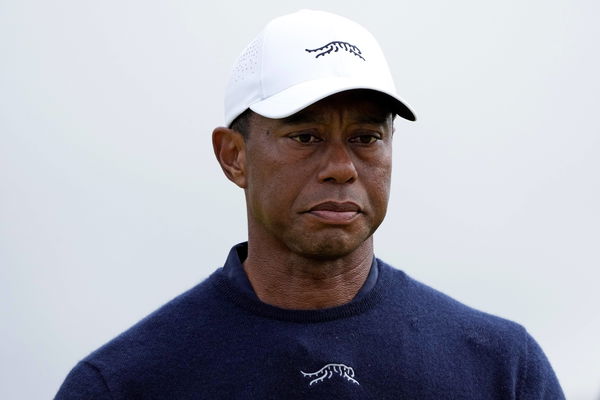
via Imago
PGA, Golf Herren The Open Championship – Second Round Jul 19, 2024 Ayrshire, SCT Tiger Woods on the 12th hole during the second round of the Open Championship golf tournament at Royal Troon. Ayrshire Royal Troon SCT, EDITORIAL USE ONLY PUBLICATIONxINxGERxSUIxAUTxONLY Copyright: xJackxGruberx 20240719_pjc_usa_476

via Imago
PGA, Golf Herren The Open Championship – Second Round Jul 19, 2024 Ayrshire, SCT Tiger Woods on the 12th hole during the second round of the Open Championship golf tournament at Royal Troon. Ayrshire Royal Troon SCT, EDITORIAL USE ONLY PUBLICATIONxINxGERxSUIxAUTxONLY Copyright: xJackxGruberx 20240719_pjc_usa_476
“There’s two things you don’t want to do in life: floss a pit bull’s teeth and aggravate Tiger Woods.” That’s how Steve Williams summed up Tiger Woods’ legendary intensity in his new book, Together We Roared. The man who spent 12 years as Woods’ caddie, witnessing his dominance firsthand, knew better than anyone what it was like to be inside the Tiger era.
Williams saw it all. Over 12 years, he was by Woods’ side for 13 major victories. He watched as Tiger built an aura so imposing that it not only won him tournaments but outright broke opponents before they even teed off.
Before teaming up with Woods, Williams caddied for golf greats like Greg Norman and Raymond Floyd. After their split, he guided Adam Scott to a major victory, further cementing his legacy as one of the greatest caddies the sport has ever seen.
ADVERTISEMENT
Article continues below this ad
Recently, on The DOM HARVEY Podcast, Williams revealed that Woods’ dominance didn’t just intimidate his rivals—it outright frustrated them. According to him, when Tiger was at his peak, he was golf. “It’s a difficult situation for a lot of the players and that—because Tiger, when he was in the peak of his power on the tour, he was getting 90% of the media coverage. Everything was Tiger—it was just Tiger this, Tiger that, Tiger this—and a lot of players got sick of being asked about Tiger instead of themselves; I get that side of the situation,” Williams explained.
Every pre-tournament press conference? About Tiger. Every broadcast? Focused on Tiger. Even players who had a great round often found their post-game interviews steering toward—you guessed it—Tiger. “They became quite, you know, a lot of resentful in a lot of ways, and it became glaring occasionally,” Williams admitted.

Some players couldn’t hide their frustration. When paired with Woods for a tournament, they knew the cameras would be on him, not them. They knew reporters would be asking about his performance rather than theirs. And some, when put in that position, couldn’t resist letting their true feelings slip.
What’s your perspective on:
Did Tiger Woods' dominance elevate golf, or did it overshadow other talented players of his era?
Have an interesting take?
Tiger Woods: The Ultimate Competitor
“Some players, when they had the chance, when they were asked about Tiger instead of themselves, you know, they gave an answer that probably they maybe wish they hadn’t said,” Williams revealed.
ADVERTISEMENT
Article continues below this ad
One such incident was during the 1997 Masters, as Tiger Woods celebrated his historic victory as the tournament’s first African American champion, golfer Fuzzy Zoeller, in an interview, made insensitive remarks that sparked instant outrage. Referring to Woods as a “little boy,” Zoeller joked about him—a comment that didn’t sit well with the public. The backlash was swift: Zoeller lost major sponsorships, including Kmart and the PGA Tour, and was forced to issue an apology. Woods, while visibly disappointed, chose to take the high road, brushing the controversy aside as he focused on his groundbreaking career.
But the worst thing you could do? Give Woods any fuel for his fire.
If there was one thing Tiger thrived on, it was proving people wrong. If a fellow pro threw shade his way, even unintentionally, Woods would take it as a challenge. Williams hinted that some players learned that lesson the hard way. “If they got drawn with Tiger that week… you never wanted to add any fuel to the fire because this guy just, you know, he just thrived on that kind of controversy,” he said.
ADVERTISEMENT
Article continues below this ad
That competitive fire is what made Woods legendary. He wasn’t just playing to win—he was playing to dominate. Every tournament, every round, every putt. The frustration from fellow players? It made sense. But Williams also saw what made Tiger different. While others grumbled about the attention, Woods embraced it. While others let distractions creep in, Woods blocked them out.
That’s why, even years after his prime, Tiger Woods remains golf’s most captivating figure. Because as Williams put it—”you don’t want to aggravate Tiger Woods.”
ADVERTISEMENT
ADVERTISEMENT
ADVERTISEMENT
ADVERTISEMENT


Did Tiger Woods' dominance elevate golf, or did it overshadow other talented players of his era?